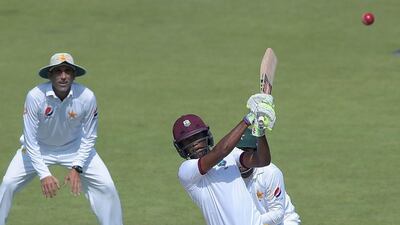Pakistan v West Indies, Sharjah Test, Day 2
Pakistan 281 v West Indies 244/6
PAK: Amir 2/44, Wahab 2/65
WI: K Brathwaite 95, Chase 50
SHARJAH // Three former schoolmates from Barbados combined to keep West Indies in the hunt for a first win against Pakistan, at the ninth attempt on their troubled tour of the UAE.
Kraigg Braithwaite was left five runs short of a fifth Test century when the umpires decided to curtail Day 2 two overs early because of bad light at Sharjah Cricket Stadium.
Two players from the year above him at Combermere, the Bridgetown high school which counts numerous West Indies players among its former pupils, also made contributions of note.
Brathwaite shared a stand worth 83 for the fifth wicket with Roston Chase, the spin-bowling allrounder. He then managed an identical number with Shane Dowrich, the wicketkeeper, for the sixth.
Paul Radley, Day 1
• West Indies finally get some wind in their sails, from Carlos Brathwaite of all people
The aggregate of the West Indies effort left them 37 runs behind Pakistan’s first innings total of 281 at stumps, and Brathwaite is eyeing a lead on Day 3.
“I’ll be good,” Brathwaite said, about his prospects of a nervy night’s sleep with a century so tantalisingly close. “The aim for me is to really build a big lead for the West Indies. That is what will be on my mind tonight.”
Despite being the youngest of the three ex-school colleagues, Brathwaite has the most experience of Test cricket. This is his 34th Test, while Chase and Dowrich have played 13 between them.
What they lack in Test caps, they make up for in their long-established understanding of each other’s games, according to Brathwaite.
“We have a good relationship,” Brathwaite, 23, said.
“I said to [Chase] to play as straight as possible. Obviously the pitch is low, so it is key we hit straight down the ground, then rotate the strike, and after that we had a good partnership.
“The pitch is cracking up a bit, and later tomorrow it will probably crack some more and get some spin. It isn’t spinning sharply at the moment.
“If we can go on and get the lead, then build on that, that will be very good for us, aiming towards winning this Test match.”
The new-found resourcefulness of West Indies belies the fact Pakistan probably feel they are still ahead in this game, given they will bowl last, when the pitch will be at its most worn.
That said, this has been a hard slog for the host team, worn down by injudicious stroke play in their innings, and Brathwaite’s doggedness in reply.
At least they had one notable highlight to celebrate. Mohammed Amir’s first catch in Test cricket – in his 20th match – was a stunning feat of athleticism and coordination.
Retreating back from extra cover to chase a top-edge from Darren Bravo, he dived full length, pushed the catch, and managed to keep hold when he hit the floor.
It was spectacular, but perhaps vital, too. Bravo is seen as the key West Indies batsman, after he posted their only century of the series so far, in the opening Test in Dubai.
“We actually train these kind of skills, and that is a quite regular thing by our fielding coach,” Amir said.
“The wicket of Bravo was very important as he is the batsman we wanted to get out as soon as possible we created the opportunity and I made the effort to get him out. So it worked well.”
pradley@thenational.ae
Follow us on Twitter @NatSportUAE
Like us on Facebook at facebook.com/TheNationalSport


